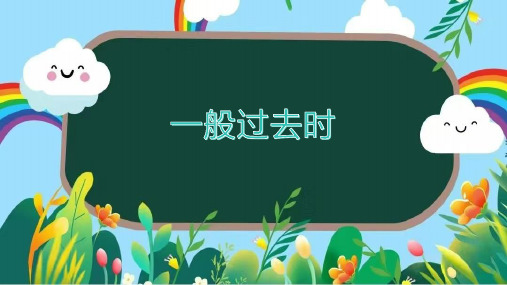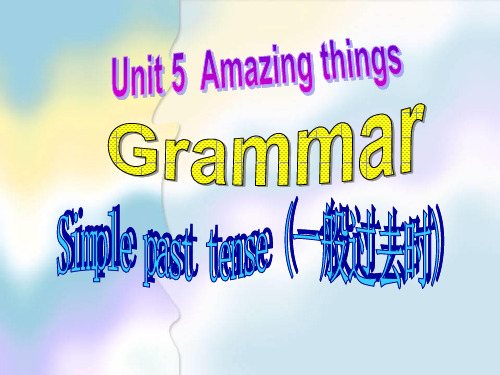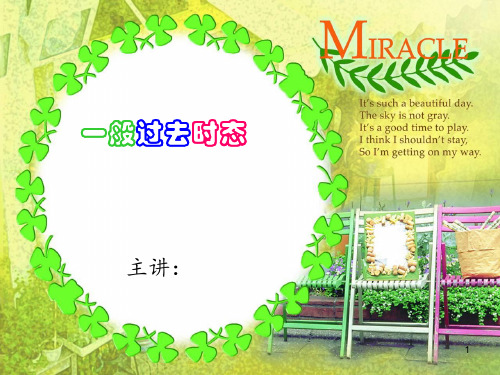初中英语(一般过去时)讲解课件(共14张ppt)
合集下载
一般过去时.语法讲解PPT

时间状语不同
一般过去时常用的时间状语包括过去的时间点、过去的时间段 等,而过去完成时常用的时间状语包括“已经”、“之前”等
。
05
一般过去时的练习与巩固
填空练习
总结词
填空练习是巩固一般过去时的有效方法,通过在句子中留空,让学生填写正确的动词时态,加深对一般过去时的 理解和运用。
详细描述
在填空练习中,教师可以选择一些包含一般过去时的句子,故意去掉动词时态部分,让学生根据上下文语境和时 态规则填写正确的时态。例如,“Yesterday, I ____(go) to the park with my family. We ____ (have) a great time.” 学生应该填写“went”和“had”。
表示过去的习惯或经常发生的动作
描述过去的习惯
一般过去时可以用来描述过去经常发 生的动作或习惯,例如“He used to smoke a pack of cigarettes a day” (他以前每天抽一包烟)。
描述过去的频率
一般过去时可以用来表示过去某个时间 段内发生的动作的频率,例如“We met every week”(我们每周见面一 次)。
一般过去时表示动作已经完成,而过去进行时则表示动作正在进行中。
总结词
时间状语不同
详细描述
一般过去时常用的时间状语包括过去的时间点、过去的时间段等,而 过去进行时常用的时间状语包括“当时”、“正在”等。
与过去完成时混淆的用法
总结词 详细描述
总结词 详细描述
动作是否完成
一般过去时表示动作已经完成,而过去完成时则表示在过去的 某个时间点之前已经完成的动作。
选择练习
总结词
选择练习是一种常见的练习方式,通过提供多个选项,让学生选择符合语境和语法规则的答案,进一 步巩固一般过去时的运用。
一般过去时常用的时间状语包括过去的时间点、过去的时间段 等,而过去完成时常用的时间状语包括“已经”、“之前”等
。
05
一般过去时的练习与巩固
填空练习
总结词
填空练习是巩固一般过去时的有效方法,通过在句子中留空,让学生填写正确的动词时态,加深对一般过去时的 理解和运用。
详细描述
在填空练习中,教师可以选择一些包含一般过去时的句子,故意去掉动词时态部分,让学生根据上下文语境和时 态规则填写正确的时态。例如,“Yesterday, I ____(go) to the park with my family. We ____ (have) a great time.” 学生应该填写“went”和“had”。
表示过去的习惯或经常发生的动作
描述过去的习惯
一般过去时可以用来描述过去经常发 生的动作或习惯,例如“He used to smoke a pack of cigarettes a day” (他以前每天抽一包烟)。
描述过去的频率
一般过去时可以用来表示过去某个时间 段内发生的动作的频率,例如“We met every week”(我们每周见面一 次)。
一般过去时表示动作已经完成,而过去进行时则表示动作正在进行中。
总结词
时间状语不同
详细描述
一般过去时常用的时间状语包括过去的时间点、过去的时间段等,而 过去进行时常用的时间状语包括“当时”、“正在”等。
与过去完成时混淆的用法
总结词 详细描述
总结词 详细描述
动作是否完成
一般过去时表示动作已经完成,而过去完成时则表示在过去的 某个时间点之前已经完成的动作。
选择练习
总结词
选择练习是一种常见的练习方式,通过提供多个选项,让学生选择符合语境和语法规则的答案,进一 步巩固一般过去时的运用。
一般过去时(12张PPT)初中英语专项复习课件

The Country mouse went to the house of the City mouse. It was a very good house. Nice food was set ready for them to eat. But just as they began to eat they heard a great noise. The City mouse cried, " Run! Run! The cat is coming!" They ran away quickly and hid.
一般过去时 初中英语专项分析
一般现在时 de 应用场景
过
动作行为
去
发
生
曾经
的
存在的状态
识别 标志词 理解 句意
答题技巧
熟练 动词 转换
yesterday last week 3 days ago
动词 过去式
熟练 句型 转换
肯定 否定 疑问
一般 过去时 He played basketball yesterday.
yesterday? Yes, I did. No, I didn’t.
动词 过去式 形态的变化
一般
直接加 ed
二般
以 e 结尾,去 e 加 ed live dance hope use
动词 过去式 形态的变化
三般
重读辅元辅,双写尾字母
stop plan
四般
辅音字母 + y 结尾,把 y 变 i 加 ed cry study worry
标志词
时间状语:last night, yesterday, the day before yesterday last week, some years ago in 1995, the other day, just now, in the past
一般过去时 初中英语专项分析
一般现在时 de 应用场景
过
动作行为
去
发
生
曾经
的
存在的状态
识别 标志词 理解 句意
答题技巧
熟练 动词 转换
yesterday last week 3 days ago
动词 过去式
熟练 句型 转换
肯定 否定 疑问
一般 过去时 He played basketball yesterday.
yesterday? Yes, I did. No, I didn’t.
动词 过去式 形态的变化
一般
直接加 ed
二般
以 e 结尾,去 e 加 ed live dance hope use
动词 过去式 形态的变化
三般
重读辅元辅,双写尾字母
stop plan
四般
辅音字母 + y 结尾,把 y 变 i 加 ed cry study worry
标志词
时间状语:last night, yesterday, the day before yesterday last week, some years ago in 1995, the other day, just now, in the past
初中英语一般过去时完整(上课ppt课件

.
行为动词一般过去时的否定式
一般过去时的否定式是在动词原形 前加助动词did not (didn’t).
主语+didn’t+动词原形
I _to_l_d_ (tell) them the news yesterday. I _d_id_n_’t__t_el_l _. them the news.
行为动词一般过去时的疑问式
Infinitive
am is
was
catch
are
were
come
begin
begun
do
break
broke
draw
bring
brought
drink
build
built
drive
buy
bought
eat
can
could
fall
.
不规则动 词表
Past tense caught came did drew drank drove ate fell
.
行为动词一般过去时的疑问式
一般过去时的特殊疑问式
疑问词+did+主语+动词原形……?
They finished their work at four.
A
B
对划线部分提问 A:What did they do at four?
B:When did they finish their work? .
我今年12岁. I _a_m_ 12 years old this year.
我去年11岁. I _w_a_s_ 11 years old last year.
他现在在北京。 He __is__ in Beijing now. 他昨天在上海。 He _w_a_s_ in Shan. ghai yesterday.
行为动词一般过去时的否定式
一般过去时的否定式是在动词原形 前加助动词did not (didn’t).
主语+didn’t+动词原形
I _to_l_d_ (tell) them the news yesterday. I _d_id_n_’t__t_el_l _. them the news.
行为动词一般过去时的疑问式
Infinitive
am is
was
catch
are
were
come
begin
begun
do
break
broke
draw
bring
brought
drink
build
built
drive
buy
bought
eat
can
could
fall
.
不规则动 词表
Past tense caught came did drew drank drove ate fell
.
行为动词一般过去时的疑问式
一般过去时的特殊疑问式
疑问词+did+主语+动词原形……?
They finished their work at four.
A
B
对划线部分提问 A:What did they do at four?
B:When did they finish their work? .
我今年12岁. I _a_m_ 12 years old this year.
我去年11岁. I _w_a_s_ 11 years old last year.
他现在在北京。 He __is__ in Beijing now. 他昨天在上海。 He _w_a_s_ in Shan. ghai yesterday.
一般过去时讲解课件(共19张PPT).ppt

否定句
1) 主语+wasn’t/weren’t+表语
He wasn’t a student ten years ago.
2) 主语+didn’t+动词原形+其他
They didn’t have a good time last night.
4.一般过去时的结构
一般疑问句
was为单数; were为复数
一般过去时的结构
4.一般过去时的结构
was为单数; were为复数
肯定句
1) 主语+was/were+表语
He was a student ten years ago.
2) 主语+动词过去式+其他
They had a good time last night.
4.一般过去时的结构
was为单数; were为复数
时间+ago类 in+年份类
yesterday morning;yesterday.... last night; last week...
two days ago in 2023
动词过去式的变化
3.动词过去式的变化 1.直接加ed work--worked look--looked 2.不发音的e结尾,去e加ed hope--hoped like--liked 3.重读的闭音节词,双协结尾字母加ed stop--stopped plan--planned 4.以辅音字母加y结尾,变y为i再加ed study--studied try--tried 5.不规则变化
What did they do last night?
总结与练习
5.总结与练习
一般过去时 1.定义:表示一个过去发生的动作或表示过去存在的状 态 2.标志词:yesterday,last...,....ago, just now..... 3.动词的过去式变化 4.一般过去时的各种句型:
一般过去时(共22张PPT)

Finish Part C on page 62.
Millie: We _____ went (go) to the Fun World Museum the day before yesterday, Daniel. It ____ was (be) so interesting! Daniel: Really? Tell me all about it. Millie: OK. We ____ saw (see) a small monkey, only 11 centimetres tall. Daniel: That’s amazing! What else? Millie: We also _____ learnt (learn) about some strange birds like dodos. They _____ lived (live) on the earth a long time ago. Daniel: That’s cool!
一般过去时的否定句 (1)be动词的否定句
I/He/She/It You/We/They
was
were was not were not at home yeou/We/They
at home yesterday.
一般过去时的否定句
(1)be动词的否定句
1.Alice was outside one sunny day. Alice wasn't outside one sunny day. 2.Mary was at home yesterday. Mary wasn't at home yesterday. 3.We were in Beijing last week. We weren't in Beijing last week.
初中英语一般过去时教学ppt课件

再加 –ed,如: stop---stopped 5. 不规则动词的过去式变化规律性不强,需多加记忆,如:
go---went, get---got, buy---bought 等
8
04
常用时间状语
9
常用时间状语
last week tomorrow yesterday often two years ago sometimes at this weekend now usually
疑问词+was/were+主语+其他 Where were you last night?
17
Summary
1. 一般过去时与一般现在时和 一般将来时的区别
2. 一般过去时 定义&结构 3. 动词过去式变形 4. 常用的时间状语 5. 否定句&疑问句形态
18
THANK YOU
19
past present
future
3
02
一般过去时 定义 & 结构
4
一般过去时定义
• 描述在过去的时间里发生的事情 或存在的状态
• Last weekend, I went to the zoo.
5
一般过去时结构
主语+动词过去式+其他+(时间状语) 例句:He read a book sterday • last night/ week/ month/ year/ weekend/ Monday…… • 数字 + day(s) / week(s) / month (s) / year(s) + ago • then (那时)
11
一般现在时 & 一般过去式转换
6
go---went, get---got, buy---bought 等
8
04
常用时间状语
9
常用时间状语
last week tomorrow yesterday often two years ago sometimes at this weekend now usually
疑问词+was/were+主语+其他 Where were you last night?
17
Summary
1. 一般过去时与一般现在时和 一般将来时的区别
2. 一般过去时 定义&结构 3. 动词过去式变形 4. 常用的时间状语 5. 否定句&疑问句形态
18
THANK YOU
19
past present
future
3
02
一般过去时 定义 & 结构
4
一般过去时定义
• 描述在过去的时间里发生的事情 或存在的状态
• Last weekend, I went to the zoo.
5
一般过去时结构
主语+动词过去式+其他+(时间状语) 例句:He read a book sterday • last night/ week/ month/ year/ weekend/ Monday…… • 数字 + day(s) / week(s) / month (s) / year(s) + ago • then (那时)
11
一般现在时 & 一般过去式转换
6
一般过去时的讲解ppt课件完整版

“studied”。
助动词did的用法
在一般过去时中,助 动词“did”用于构 成疑问句和否定句。
在回答一般过去时的 疑问句时,可以用 “did”的相应形式 进行回答。
“did”后面跟动词 原形,表示过去某个 时间发生的动作或状 态。
一般过去时的否定句和疑问句
否定句
在动词前加“didn’t”,后面跟动词原形,表示过去某个时间没有发生的动 作或状态。例如:“I didn’t go to the park yesterday.”(昨天我没有去公 园。)
陈述句改疑问句
指导学生将一般过去时的 陈述句改写为疑问句,注 意语序的调整和助动词 did的使用。
特殊疑问句的回答
给出特殊疑问句及其回答 ,让学生熟悉一般过去时 特殊疑问句的构成和回答 方式。
阅读理解中一般过去时的识别与运用
阅读文章并回答问题
提供一篇含有一般过去时的文章,让学生阅读后回答与文章内容 相关的问题。
疑问句
将助动词“did”放在主语前构成疑问句,表示询问过去某个时间是否发生了某 个动作或状态。例如:“Did you go to the park yesterday?”(昨天你去公 园了吗?)
04
一般过去时的重点与难点
BIG DATA EMPOWERS TO CREATE A NEW
ERA
不规则动词的过去式
识别一般过去时的标志词
列出一般过去时的常见标志词,如yesterday, last week等,让学 生在阅读过程中识别并标注出来。
运用一般过去时描述事件
要求学生运用一般过去时描述一个发生在过去的事件,注意动词过 去式的正确使用和句子结构的完整性。
THANKS
感谢观看
1 2
助动词did的用法
在一般过去时中,助 动词“did”用于构 成疑问句和否定句。
在回答一般过去时的 疑问句时,可以用 “did”的相应形式 进行回答。
“did”后面跟动词 原形,表示过去某个 时间发生的动作或状 态。
一般过去时的否定句和疑问句
否定句
在动词前加“didn’t”,后面跟动词原形,表示过去某个时间没有发生的动 作或状态。例如:“I didn’t go to the park yesterday.”(昨天我没有去公 园。)
陈述句改疑问句
指导学生将一般过去时的 陈述句改写为疑问句,注 意语序的调整和助动词 did的使用。
特殊疑问句的回答
给出特殊疑问句及其回答 ,让学生熟悉一般过去时 特殊疑问句的构成和回答 方式。
阅读理解中一般过去时的识别与运用
阅读文章并回答问题
提供一篇含有一般过去时的文章,让学生阅读后回答与文章内容 相关的问题。
疑问句
将助动词“did”放在主语前构成疑问句,表示询问过去某个时间是否发生了某 个动作或状态。例如:“Did you go to the park yesterday?”(昨天你去公 园了吗?)
04
一般过去时的重点与难点
BIG DATA EMPOWERS TO CREATE A NEW
ERA
不规则动词的过去式
识别一般过去时的标志词
列出一般过去时的常见标志词,如yesterday, last week等,让学 生在阅读过程中识别并标注出来。
运用一般过去时描述事件
要求学生运用一般过去时描述一个发生在过去的事件,注意动词过 去式的正确使用和句子结构的完整性。
THANKS
感谢观看
1 2
一般过去时讲解PPT课件

。
did
助动词,用于构成一般过去时的 疑问句和否定句。
主语
句子中的动作执行者,可以是名 词、代词等。
例如
What did you do yesterday? 你 昨天做了什么?
其他成分
包括宾语、状语等,根据句子需 要而定。
动词原形
指动词的基本形式,即不加任何 时态或语态标记的形式。
特殊疑问句实例分析
when、after、 before、as等引导的 表示过去的时间状语 从句。
已经、曾经、刚才、 那时等表示过去的时 间副词。
02
一般过去时肯定句结构
主语+动词过去式+其他成分
01
02
03
主语
句子中的主体,可以是人 、物或抽象概念。
动词过去式
表示过去某个时间里发生 的动作或状态。动词的过 去式可分为规则变化和不 规则变化两种。
表示过去某个时间里发生的动 作或状态。
用法
陈述过去的事实或情况,描述 过去经常或反复发生的动作。
现在完成时
表示过去发生的动作对现在造 成的影响或结果,或从过去已 经开始,持续到现在的动作或 状态。
用法
强调过去与现在的联系,表达 一个动作从过去一直延续到现
在。
两者在时间状语上的区别
01
02
03
04
一般过去时
一般过去时讲解PPT课件
目录 Contents
• 一般过去时基本概念 • 一般过去时肯定句结构 • 一般过去时否定句结构 • 一般过去时疑问句结构 • 一般过去时特殊疑问句结构 • 一般过去时与现在完成时的比较
01
一般过去时基本概念
定义与作用
定义
一般过去时表示过去某个时间里 发生的动作或状态。
did
助动词,用于构成一般过去时的 疑问句和否定句。
主语
句子中的动作执行者,可以是名 词、代词等。
例如
What did you do yesterday? 你 昨天做了什么?
其他成分
包括宾语、状语等,根据句子需 要而定。
动词原形
指动词的基本形式,即不加任何 时态或语态标记的形式。
特殊疑问句实例分析
when、after、 before、as等引导的 表示过去的时间状语 从句。
已经、曾经、刚才、 那时等表示过去的时 间副词。
02
一般过去时肯定句结构
主语+动词过去式+其他成分
01
02
03
主语
句子中的主体,可以是人 、物或抽象概念。
动词过去式
表示过去某个时间里发生 的动作或状态。动词的过 去式可分为规则变化和不 规则变化两种。
表示过去某个时间里发生的动 作或状态。
用法
陈述过去的事实或情况,描述 过去经常或反复发生的动作。
现在完成时
表示过去发生的动作对现在造 成的影响或结果,或从过去已 经开始,持续到现在的动作或 状态。
用法
强调过去与现在的联系,表达 一个动作从过去一直延续到现
在。
两者在时间状语上的区别
01
02
03
04
一般过去时
一般过去时讲解PPT课件
目录 Contents
• 一般过去时基本概念 • 一般过去时肯定句结构 • 一般过去时否定句结构 • 一般过去时疑问句结构 • 一般过去时特殊疑问句结构 • 一般过去时与现在完成时的比较
01
一般过去时基本概念
定义与作用
定义
一般过去时表示过去某个时间里 发生的动作或状态。
一般过去时学习课件 (共22张PPT)

注意:一般过去时 的否定形式
• 一、be动词的否定,我们在be动词的后面+not。 • 我没在一个安静的街道。 • ① I was not in a quiet street. • 十年前这儿有许多树。 • ② There were a lot of trees ten years ago. • 二、助动词的过去式的一般否定形式。 • ① 我知道这个地方。 • I knew this place. • ② 我不知道这个地方。 • I didn’t know this place. 助动一出现,动词变原形。
一般过去时
顺口溜
动词过去式,ed来结尾 一般直接加,见e只加d 辅y结尾y变i,再加ed 重读辅元辅,双写尾字母
• Listen! Your heart is beating. • Every sentence has a heart too. • ——动词 • 人无心,活不了。 • 句子无心,也活不了。
have dream
smile don’t know
is
break
fall
wake
realize take
庐山真面目!
问题:为何刚才 的那些动词都要 用过去式? Last night!
一般过去时
一起来唱rap! 动词过去式,ed来结尾 一般直接加,见e只加d 辅y结尾y变i,再加ed 重读辅元辅,双写尾字母
动词过去式 的不规则变
化
一般过去时 的时间标志
词
• yesterday:昨天
…ago:多久以前
last…:上一个…
• the day before yesterday:前天
just now:刚刚
• in 2008:在2008年
一般过去时ppt课件

16
行为动词的一般过去时
(1)肯定句 :主语+动词的过去式+… He played tennis last week.
(2) 否定句 : 主语 +did not+ V原形 +… week.
He did not play tennis last
(3)一般疑问句 :Did + 主语 + V原形 +….. Did he play tennis last week ?
He wasn’t…
一般疑问句 Is he …?
Was he…?
特殊疑问句 疑问词+is he … ? 疑问词+was he …?
12
• 名词变复数(第3人称单数),过去式,V-ing 形式, • “y”后变化口诀:
“元音字母+y” , 直接加, “辅音字母+y,” 去掉它 , “y后面的-ing,” 随便加。
餐我吃面条。)
didn’t have
I did not have eggs and milk for breakfast yesterday
morning.(昨天早餐我没吃面条。)
He did his homework yesterday evening.(昨天晚上他做家庭 作业。)
He did not do his homework yesterday evening.
22
Li Ming studied English this morning.
(变成一般疑问句)
Did LiMing study English this morning ? (李明今天早晨学英语了吗?)
Did LiMing studied English this morning? 行为动词用原形
行为动词的一般过去时
(1)肯定句 :主语+动词的过去式+… He played tennis last week.
(2) 否定句 : 主语 +did not+ V原形 +… week.
He did not play tennis last
(3)一般疑问句 :Did + 主语 + V原形 +….. Did he play tennis last week ?
He wasn’t…
一般疑问句 Is he …?
Was he…?
特殊疑问句 疑问词+is he … ? 疑问词+was he …?
12
• 名词变复数(第3人称单数),过去式,V-ing 形式, • “y”后变化口诀:
“元音字母+y” , 直接加, “辅音字母+y,” 去掉它 , “y后面的-ing,” 随便加。
餐我吃面条。)
didn’t have
I did not have eggs and milk for breakfast yesterday
morning.(昨天早餐我没吃面条。)
He did his homework yesterday evening.(昨天晚上他做家庭 作业。)
He did not do his homework yesterday evening.
22
Li Ming studied English this morning.
(变成一般疑问句)
Did LiMing study English this morning ? (李明今天早晨学英语了吗?)
Did LiMing studied English this morning? 行为动词用原形
人教版初中英语一般过去时态专项讲解 课件 (共13张ppt)

12--Who ___the window? --Xiao Ming did. A. break B. breaks C. broke
D. is breaking
13.I___if you'd like to see the film with me tonight.
A.wondered
B.wondering
7.linda___fishing with me yesterday,Instead, she went shopping with her father. A. not went B. went out C. didn't go D. didn't went
8.-___you in the computer room a moment ago? _No, I____.
3. My uncle ___in he army from 1989 to 1999. A. serveed B. served C.serves D. serving
根据时间判断此句是一般过去时态,因此选择(B)
4.I__A__ very late last night. Because we have a test today. A. studied B.studyed C.study D. studies
5.The car__B_ because the traffic lights were on at that moment. A.stoped B. stopped C.stops D. stopping
6.They ____ here just now. They played games on the playground. A. isn't B. aren't C.weren't D. wasn't
一般过去时(18张PPT)初中英语专项复习课件

Байду номын сангаас
考向2 含有实义动词的一般过去时
肯定句
主语+ 动词过去式+ 其他.
否定句
主语+didn’t+ 动原+ 其他.
句式 一般疑问句 变化
特殊疑问句
疑问词+ 一 般疑问句?
Did+ 主语+ 动原+ 其他?
肯定回答:Yes, 主语人称代词+did. 否定回答:No, 主语人称代词+didn’t.
Ⅲ. Simple Past Tense Their journey lasted about twenty years! _W__e_h_a_d__a_g_r_e_a_t_t_ri_p_.____________________________ _W__e_l_e_a_rn__e_d_s_o_m__u_c_h_.___________________________ _W__e_h_e_a_r_d_a__lo_t__a_b_o_u_t_h_im___o_n_t_h_e_S_i_lk__R_o_a_d_._________ I can use the simple past tense properly. ☆☆ ☆ ☆ ☆
疑问构成有方法,did 放在主语前;
还有一点不能忘,后面动词要还原。
B
D
sat
went
句型转换 1 Martin met Tom yesterday。(改为否定句)
Martin didn't meet Tom yesterday. 2 He worked for the King for 17years .(改为一般疑问句)
肯定句
否定句 句 式 一般疑问句 变 化 特殊疑问句
考向2 含有实义动词的一般过去时
肯定句
主语+ 动词过去式+ 其他.
否定句
主语+didn’t+ 动原+ 其他.
句式 一般疑问句 变化
特殊疑问句
疑问词+ 一 般疑问句?
Did+ 主语+ 动原+ 其他?
肯定回答:Yes, 主语人称代词+did. 否定回答:No, 主语人称代词+didn’t.
Ⅲ. Simple Past Tense Their journey lasted about twenty years! _W__e_h_a_d__a_g_r_e_a_t_t_ri_p_.____________________________ _W__e_l_e_a_rn__e_d_s_o_m__u_c_h_.___________________________ _W__e_h_e_a_r_d_a__lo_t__a_b_o_u_t_h_im___o_n_t_h_e_S_i_lk__R_o_a_d_._________ I can use the simple past tense properly. ☆☆ ☆ ☆ ☆
疑问构成有方法,did 放在主语前;
还有一点不能忘,后面动词要还原。
B
D
sat
went
句型转换 1 Martin met Tom yesterday。(改为否定句)
Martin didn't meet Tom yesterday. 2 He worked for the King for 17years .(改为一般疑问句)
肯定句
否定句 句 式 一般疑问句 变 化 特殊疑问句
PPT讲解(一般过去时).ppt

(was + not = wasn't , were + not = weren't) 在右侧编辑区输入内容
He wasn't an English teacher ten years ago. 在右侧编辑区输入内容
(3)一般过去时的一般疑问句: a.Did + 主语 + 动词原形 + 宾语 ? Did you study English in 1990 ? b.Was/Were + 主语 + 表语 ? Was he a pupil five years ago ?
3
3._______ you ______ (go) to the Great Wall last year?
5
5.The old man _______(be)ill and went to see a doctor.
2Hale Waihona Puke 2.Jack ____________ (study) for the English test last Sunday.
I was at home yesterday. 昨天我在家。
02
2、在表示过去某个时间里发生的动作,用动词的过去式构成。如:
I visited my uncle yesterday. 昨天我拜访了我的叔叔。
各种句式
01
(1)一般过去时的肯定 陈述句:主语 + 动词过
去式 + 宾语或表语。
He worked in Shanghai ten years ago.
PPT讲解(一般过去 时).ppt
演讲人
目录
PPT讲解(一般过去时).ppt
PPT讲解(一般过去时).ppt
一、定义:表示在的过去某个时间里所发生的动作或存在的状态。
- 1、下载文档前请自行甄别文档内容的完整性,平台不提供额外的编辑、内容补充、找答案等附加服务。
- 2、"仅部分预览"的文档,不可在线预览部分如存在完整性等问题,可反馈申请退款(可完整预览的文档不适用该条件!)。
- 3、如文档侵犯您的权益,请联系客服反馈,我们会尽快为您处理(人工客服工作时间:9:00-18:30)。
They didn’t hope that the car stopped.
句型变化 1.系动词be
陈述句(肯定): She was a doctor two years ago. 陈述句(否定): She was not a doctor two years ago. 一般疑问句: Was she a doctor 1)表示过去某个时间发生的动作或存在的状态,常
和表示过去的时间状语连用;2)也表示过去经常或反复发生的 动作,常和表示频度的时间状语连用。 • 标志性状语 2.时间状语:yesterday last night
in 1990 two days ago 等 3.频度副词:oftenalways 等
6. There was a small rabbit in the cage.(针对画线部分提问) __________________________________________
肯定回答:Yes, they did. 否定回答:No, they didn’t. 特殊疑问句: When did they go to the park?
动词一般过去时,表示过去发生的事; be用was或用were, have,has变had; 谓语动词过去式,过去时间坐标志; 一般动词加-ed,若是特殊得硬记。 否定句很简单,主语之后didn’t添; 疑问句也不难,did放在主语前; 如果谓语之前有did,谓语动词需还原; 动词若是was,were,否定就把not添。
3. _____________________ on Sundays. They went to the park last Monday.
4. _____________________at breakfast. But yesterday he didn’t read the newspaper.
肯定回答:Yes, she was. 否定回答:No, she wasn’t. 特殊疑问句: When was she a doctor?
2. 实意动词过去式
陈述句(肯定): They went to the park last Monday. 陈述句(否定): They didn’t go to the park last Monday. 一般疑问句: Did they go to the park last Monday?
陈述句的否定形式借助助动词did 后,动词过去式played要 还原成动词原行play.
• 二.把下列句子改成相应时态
1. He usually gets up early in the morning. But ______________________ late today.
2. She usually works from 8 a.m. to 5 p.m. But yesterday __________________________
11.dig—dug 12.dig—
• 一.改错
• 1. He watch TV here ten minutes ago. 他十分钟前在这里看电视。
watch在这这个动作是十分钟前发生的,属于过去时,所以 动词里是错误的,我们要把它改成过去式watched。
。2. They didn’t played basketball yesterday. 昨天,他们没有打篮球。
3. They finished their homework.(改为一般疑问句) _____________________
4. She was angry. (改为一般疑问句) _____________________
5. He went to Beijing last summer.(针对画线部分提问) _________________________________________
4.例句:I got up at 7:00 yesterday. My father was at work yesterday afternoon. He always went to work by bus last year.
• 一过去时时有两种形式: • 1.系动词be的一般过去时的形式:was(am, is), were(are) • was用于第一人称单数和第三人称单数形式的主语之后; • were用于所有其他的人称和数。
5. I usually go shopping on weekends. But this weekend __________________________
• 三.句型转换
1.I was so sleepy .(变为否定句) ______________________
2.He liked playing computer games.(变为否定句) _____________________
• 1. look • 4. carry • 7. call • 10.like • 13.dance • 16.stay
2. live 5. hope 8. finish 11.play 14.cry 17.cook
3. stop 6. trip 9. want 12.watch
15.plan 18.invent
• 不规则动词的变化规律不明显,需要平时 多加记忆。
• 1.do—did were
2. is/am—was 3.are—
• 4.have—had e—came 6.put— put
• 7.make—made 8.drive—drove 9.get— got
• 10.eat—ate dug
• 我昨天去购物了。 • I went shopping yesterday.
• 他昨天晚上没有看电视。 • He did not watch TV last night.
• 你过去是个老师吗? • Were you a teacher?
• 为什么她去年离开了学校? Why did she leave the school?
例句: He was born in 1997.
There were many mice in that room.
I was so tired. • 2.实意动词过去式的形式:did(do), stopped(stop),
finished(finish), studied(study), hoped(hope) 例句:She studied very hard to go to the college.
句型变化 1.系动词be
陈述句(肯定): She was a doctor two years ago. 陈述句(否定): She was not a doctor two years ago. 一般疑问句: Was she a doctor 1)表示过去某个时间发生的动作或存在的状态,常
和表示过去的时间状语连用;2)也表示过去经常或反复发生的 动作,常和表示频度的时间状语连用。 • 标志性状语 2.时间状语:yesterday last night
in 1990 two days ago 等 3.频度副词:oftenalways 等
6. There was a small rabbit in the cage.(针对画线部分提问) __________________________________________
肯定回答:Yes, they did. 否定回答:No, they didn’t. 特殊疑问句: When did they go to the park?
动词一般过去时,表示过去发生的事; be用was或用were, have,has变had; 谓语动词过去式,过去时间坐标志; 一般动词加-ed,若是特殊得硬记。 否定句很简单,主语之后didn’t添; 疑问句也不难,did放在主语前; 如果谓语之前有did,谓语动词需还原; 动词若是was,were,否定就把not添。
3. _____________________ on Sundays. They went to the park last Monday.
4. _____________________at breakfast. But yesterday he didn’t read the newspaper.
肯定回答:Yes, she was. 否定回答:No, she wasn’t. 特殊疑问句: When was she a doctor?
2. 实意动词过去式
陈述句(肯定): They went to the park last Monday. 陈述句(否定): They didn’t go to the park last Monday. 一般疑问句: Did they go to the park last Monday?
陈述句的否定形式借助助动词did 后,动词过去式played要 还原成动词原行play.
• 二.把下列句子改成相应时态
1. He usually gets up early in the morning. But ______________________ late today.
2. She usually works from 8 a.m. to 5 p.m. But yesterday __________________________
11.dig—dug 12.dig—
• 一.改错
• 1. He watch TV here ten minutes ago. 他十分钟前在这里看电视。
watch在这这个动作是十分钟前发生的,属于过去时,所以 动词里是错误的,我们要把它改成过去式watched。
。2. They didn’t played basketball yesterday. 昨天,他们没有打篮球。
3. They finished their homework.(改为一般疑问句) _____________________
4. She was angry. (改为一般疑问句) _____________________
5. He went to Beijing last summer.(针对画线部分提问) _________________________________________
4.例句:I got up at 7:00 yesterday. My father was at work yesterday afternoon. He always went to work by bus last year.
• 一过去时时有两种形式: • 1.系动词be的一般过去时的形式:was(am, is), were(are) • was用于第一人称单数和第三人称单数形式的主语之后; • were用于所有其他的人称和数。
5. I usually go shopping on weekends. But this weekend __________________________
• 三.句型转换
1.I was so sleepy .(变为否定句) ______________________
2.He liked playing computer games.(变为否定句) _____________________
• 1. look • 4. carry • 7. call • 10.like • 13.dance • 16.stay
2. live 5. hope 8. finish 11.play 14.cry 17.cook
3. stop 6. trip 9. want 12.watch
15.plan 18.invent
• 不规则动词的变化规律不明显,需要平时 多加记忆。
• 1.do—did were
2. is/am—was 3.are—
• 4.have—had e—came 6.put— put
• 7.make—made 8.drive—drove 9.get— got
• 10.eat—ate dug
• 我昨天去购物了。 • I went shopping yesterday.
• 他昨天晚上没有看电视。 • He did not watch TV last night.
• 你过去是个老师吗? • Were you a teacher?
• 为什么她去年离开了学校? Why did she leave the school?
例句: He was born in 1997.
There were many mice in that room.
I was so tired. • 2.实意动词过去式的形式:did(do), stopped(stop),
finished(finish), studied(study), hoped(hope) 例句:She studied very hard to go to the college.
